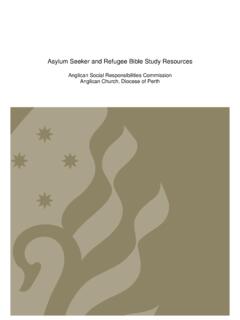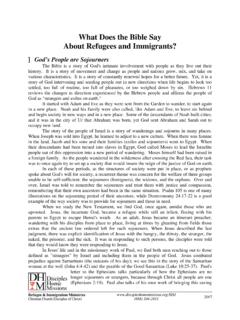Transcription of Biblical Texts on Immigration, Refugees, and the Stranger
1 Biblical Texts on immigration , refugees , and the Stranger Gen 12:1 3: The LORD said to Abram, Go forth from your native land and from your father s house to the land that I will show you. I will make of you a great nation, and I will bless you; I will make your name great, and you shall be a blessing. I will bless those who bless you and curse him that curses you; and all the families of the earth shall bless themselves by you. Abraham: the world s first immigrant. Gen 12:10 20 (and variants): And Abimelech said, Here, my land is before you; settle wherever you please (20:15); Abimelech then charged all the people, saying, Anyone who molests this man or his wife shall be put to death (26:11). Abraham and his family, strangers in strange lands, at the mercy of foreign kings, are treated with respect. Gen 15:13: He said to Abram, Know well that your offspring shall be strangers in a land not theirs.
2 The Israelites were strangers in Egypt and how were they treated there? Should we be emulating Pharaoh? Gen 18:2 5: Looking up, he saw three men standing near him. As soon as he saw them, he ran from the entrance of the tent to greet them and, bowing to the ground, he said, My lords, if it please you, do not go on past your servant. Let a little water be brought; bathe your feet and recline under the tree. And let me fetch a morsel of bread that you may refresh yourselves; then go on seeing that you have come your servant s way. Abraham as a model of hospitality for the Stranger who passes by. Gen 23:3 6: Then Abraham rose from beside his dead, and spoke to the Hittites, saying, I am a resident alien among you; sell me a burial site among you, that I may remove my dead for burial. And the Hittites replied to Abraham, saying to him, Hear us, my lord: you are the elect of God among us.
3 Bury your dead in the choicest of our burial places; none of us will withhold his burial place from you for burying your dead. The Hittites modeling the appropriate behavior toward a Stranger in their land. Gen 37:1: Now Jacob was settled in the land where his father had sojourned, the land of Canaan (see also Gen 17:8; 28:4; 36:7; Exod 6:4). Canaan not as homeland for Abraham and his family, but as the place where they were once strangers we were all immigrants once. Gen 41:38 43: And Pharaoh said to his courtiers, Could we find another like him, a man in whom is the spirit of God? So Pharaoh said to Joseph, Since God has made all this known to you, there is none so discerning and wise as you. You shall be in charge of my court, and by your command shall all my people be directed; only with respect to the throne shall I be superior to you. Pharaoh further said to Joseph, See, I put you in charge of all the land of Egypt.
4 And removing his signet ring from his hand, Pharaoh put it on Joseph s hand; and he had him dressed in robes of fine linen, and put a gold chain about his neck. He had him ride in the chariot of his second-in-command, and they cried before him, Abrek! Thus he placed him over all the land of Egypt. The Pharaoh of Genesis demonstrating the honor due to the immigrant Joseph who contributes to his adopted society; constrast this with the new pharaoh of Exodus (see below); note also the honor given to Joseph s family in light of his contributions, 45:18 20. Exod 1:8 10: A new king arose over Egypt who did not know Joseph. And he said to his people, Look, the Israelite people are much too numerous for us. Let us deal shrewdly with them, so that they may not increase; otherwise in the event of war they may join our enemies in fighting against us and rise from the ground.
5 How a leader acts who does not recognize the valuable contributions of immigrants, but governs instead by fear. Exod 1:15 21: The king of Egypt spoke to the Hebrew midwives, one of whom was named Shiphrah and the other Puah, saying, When you deliver the Hebrew women, look at the birthstool: if it is a boy, kill him; if it is a girl, let her live. The midwives, fearing God, did not do as the king of Egypt had told them; they let the boys live. So the king of Egypt summoned the midwives and said to them, Why have you done this thing, letting the boys live? The midwives said to Pharaoh, Because the Hebrew women are not like the Egyptian women: they are vigorous. Before the midwife can come to them, they have given birth. And God dealt well with the midwives; and the people multiplied and increased greatly. And because the midwives feared God, He established households for them.
6 An act of civil disobedience against unjust laws and fear-mongering rulers. Exod 12:49: There shall be one law for the citizen and for the Stranger who dwells among you. Even for Israel s most culturally identifying rites, such as the Passover, one law for both native and immigrant; see also Lev 24:22; Num 9:14. Exod 22:20: You shall not wrong a Stranger or oppress him, for you were strangers in the land of Egypt. Straight up. Exod 23:9: You shall not oppress a Stranger , for you know the feelings of a Stranger , having yourselves been strangers in the land of Egypt. Straight up. Lev 19:10: You shall not pick your vineyard bare, or gather the fallen fruit of your vineyard; you shall leave them for the poor and the Stranger . The Stranger as a vulnerable class, and therefore in need of special legal and social protection. Lev 19:33 34: When a Stranger resides with you in your land, you shall not wrong him.
7 The Stranger who resides with you shall be to you as one of your citizens; you shall love him as yourself, for you were strangers in the land of Egypt. Straight up. Lev 25:23: The land is Mine; you are but strangers resident with me. The Israelites, even when settled in the promised land, are still strangers themselves. Know where the true power lies. Num 15:14 16: And when, throughout the ages, a Stranger who has taken up residence with you, or one who lives among you, would present an offering by fire of pleasing odor to the LORD as you do, so shall it be done by the rest of the congregation. There shall be one law for you and for the resident Stranger ; it shall be a law for all time throughout the ages. You and the Stranger shall be alike before the LORD; the same ritual and the same rule shall apply to you and to the Stranger who resides among you.
8 You and the Stranger shall be alike before the Lord. Num 20:14 21: From Kadesh, Moses sent messengers to the king of Edom: Thus says your brother Israel: You know all the hardships that have befallen us; that our ancestors went down to Egypt, that we dwelt in Egypt a long time, and that the Egyptians dealt harshly with us and our ancestors. We cried to the LORD and He heard our plea, and He sent a messenger who freed us from Egypt. Now we are in Kadesh, the town on the border of your territory. Allow us, then, to cross your country. We will not pass through fields or vineyards, and we will not drink water from wells. We will follow the king s highway, turning off neither to the right nor to the left until we have crossed your territory. But Edom answered him, You shall not pass through us, else we will go out against you with the sword. We will keep to the beaten track, the Israelites said to them, and if we or our cattle drink your water, we will pay for it.
9 We ask only for passage on foot it is but a small matter. But they replied, You shall not pass through! And Edom went out against them in heavy force, strongly armed. So Edom would not let Israel cross their territory, and Israel turned away from them. Edom as an example of how not to treat the refugee, even one who wants only to cross through territory to reach the land beyond as in the case of refugees trying to reach Europe today. Num 23:9: As I see them from the mountain tops, gaze on them from the heights; there is a people that dwells apart, not reckoned among the nations. Israel as refugee people, not reckoned among the nations, but viewed as an existential threat by Balak, the king of Moab, who tries to have them cursed by the prophet Balaam. Deut 10:16 19: Cut away, therefore, the thickening about your hearts and stiffen your necks no more.
10 For the LORD your God is God supreme and Lord supreme, the great, the mighty, and the awesome God, who shows no favor and takes no bribe, but upholds the cause of the fatherless and the widow, and befriends the Stranger , providing him with food and clothing. You too must befriend the Stranger , for you were strangers in the land of Egypt. God as the one who fights for the Stranger ; our care for the Stranger being a case of imitatio dei. Deut 24:14: You shall not abuse a needy or destitute laborer, whether a fellow countryman or a Stranger in one of the communities of your land. How to treat the laborer, with no distinction made between native and immigrant. Deut 24:17: You shall not subvert the rights of the Stranger or the fatherless. Straightforward. Deut 24:19-21: When you reap the harvest in your field and overlook a sheaf in the field, do not turn back to get it; it shall go to the Stranger , the fatherless, and the widow in order that the LORD your God may bless you in all your undertakings.










